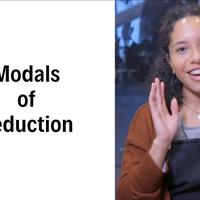How to use modal verbs of deduction - English In A Minute - YouTube
Hi, everyone!
Welcome back to English In A Minute.
We're going to look at how to use modal verbs
when making a deduction
– that's when we make guesses
about what is happening.
Let's look at some examples.
Use 'must' when you are certain or almost certain
that something is true.
For example: Phil's hair is wet – it must be rainy.
Use 'can't' to say when you are certain something is not true.
For example: Phil's hair is wet – it can't be sunny.
We can use 'might', 'may' or 'could'
to talk about possibility. Let's look at some examples.
Sam is late for work.
We don't know why Sam is late,
but we can make a guess. For example:
Her car could be broken.
Another possibility is: She might still be asleep.
One final possibility now: There may be a lot of traffic.
Well, it must be time to finish now.
Thanks for joining us. Bye!

